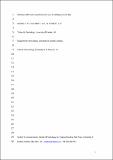Individual differences in preferences for cues to intelligence in the face
Date
05/2014Metadata
Show full item recordAbstract
We tested for individual differences in women's preferences for cues to intelligence in male faces in accordance with hormonal status (i.e. menstrual cycle phase and use of hormonal contraceptives), relationship status and context, and self-rated intelligence. There were no effects of hormonal or relationship status (Studies 1 and 2) on preferences. There was, however, a positive relationship between self-rated intelligence and preferences for cues to intelligence in the face in the context of a long-term relationship, suggesting context-specific assortment (Study 3). In Study 4, self-rated partner intelligence correlated with preferences for facial cues to intelligence. We discuss these results in the context of intelligence as a fitness indicator and suggest that future research must control for assortative mating for cognitive traits in order to better understand intelligence in mate choice.
Citation
Moore , F R , Law Smith , M J & Perrett , D I 2014 , ' Individual differences in preferences for cues to intelligence in the face ' , Intelligence , vol. 44 , no. May-June , pp. 19-25 . https://doi.org/10.1016/j.intell.2014.02.003
Publication
Intelligence
Status
Peer reviewed
ISSN
0160-2896Type
Journal article
Description
Date of acceptance: 03/02/2014Collections
Items in the St Andrews Research Repository are protected by copyright, with all rights reserved, unless otherwise indicated.

